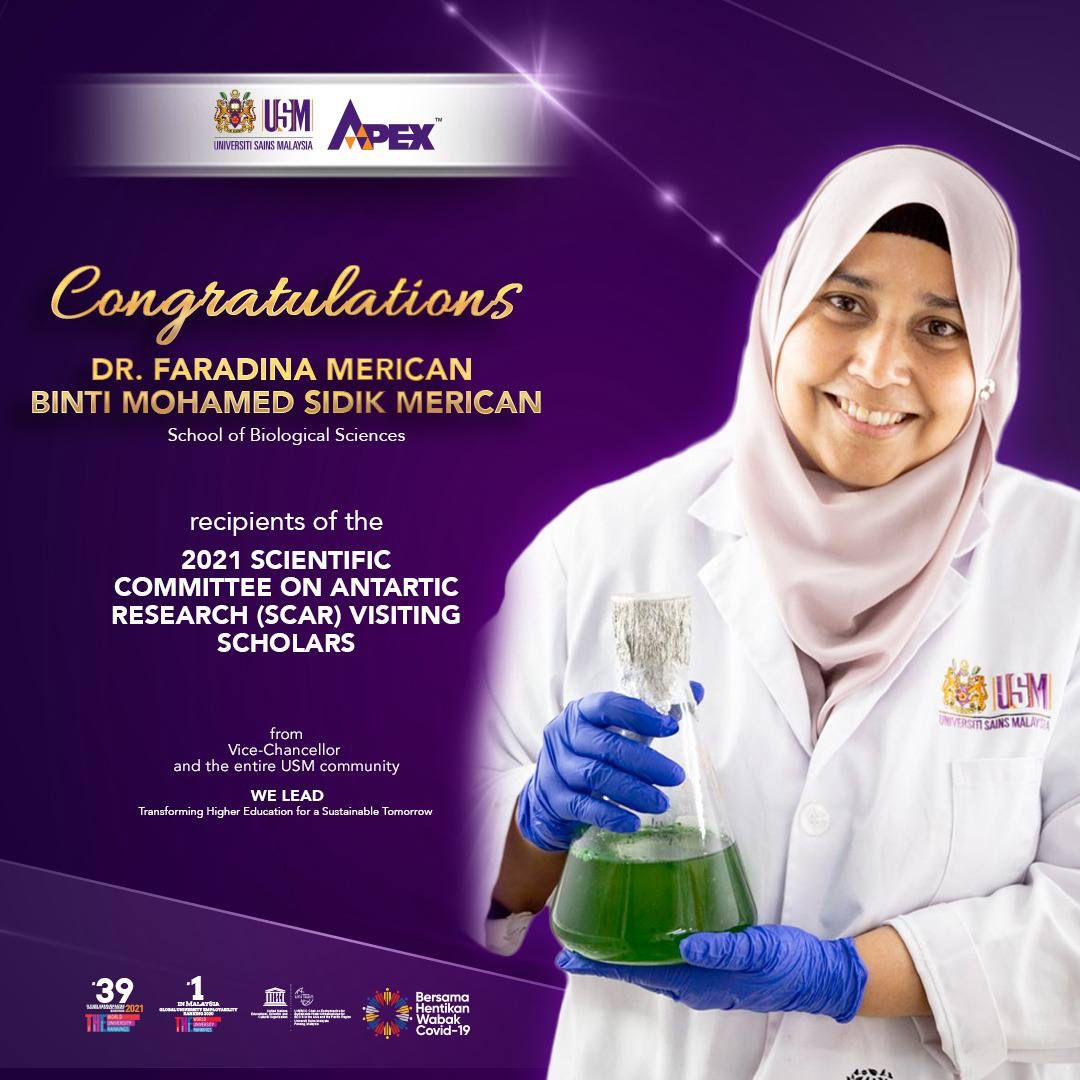FARADINA MERICAN CHOSEN AS RECIPIENT OF THE 2021 SCAR VISITING SCHOLARSHIPS
PENANG, 23 February 2022 - A lecturer in Environmental Biology at the Universiti Sains Malaysia (USM) School of Biological Sciences, Dr. Faradina Merican Mohamed Sidik Merican, has been announced as one of the recipients of the 2021 Visiting Scholarships by the Scientific Committee on Antartic Research (SCAR).
Faradina will visit the British Antarctic Survey, UK as part of a project to investigate antibiotic resistance in eukaryotic algae and place this discovery in a wider context of Antarctic research efforts to identify potential key microbial contributions.

The USM Vice-Chancellor, Professor Dato’ Dr Faisal Rafiq Mahamd Adikan congratulated her on the selection as part of the project and wished her success.
Faridina pursued her Undergraduate degree and Master's at the USM School of Biological Sciences, here in Penang. She graduated with a PhD from the University of Canterbury, New Zealand. She majors in Environmental Sciences and is a specialist in microalgal taxonomist and ecologist.
When contacted recently, Faradina said, “I am extremely thrilled and grateful for this opportunity. My first involvement in Antarctic research was during my Master’s degree. My supervisor, Professor Mashhor Mansor, who was also the Dean of the School of Biological Sciences at that time, offered me the opportunity to participate in an Antarctic expedition. Prof Mashhor’s passion for Antarctic research was infectious. So, in 2004, on board the Russian ship, Vasiliy Golovnin and in collaboration with the Australian Antarctic Division (AAD), I was on my way to collect my first Antarctic microalgae samples.”
She also added, “As a result from that, I discovered my passion in microalgae, and especially the blue-green algae (scientific name: cyanobacteria which, like bacteria, are prokaryotic organisms). We are breathing oxygen today because, 3.5 billion years ago, unicellular blue-green algae in the ocean started the photosynthesizing process and this eventually led to the Great Oxygenation Event, which ultimately allowed the rise of eukaryotic organisms (us among others).”
“The more I study microalgae, the more intriguing they become. There have been so many questions that I really wanted answers for. This has led me into various research areas from diversity to ecology, phylogeny, toxicity and now antibiotic resistance. I believe my quest towards understanding the responses and adaptations of microalgae towards environmental change drivers in Antarctica lines up perfectly with the interest of the SCAR research community,” she added.
This scholarship recipient will also work together with world-leading Antarctic scientists in the British Antarctic Survey, and this will help the researcher to strengthen and develop existing collaborations and allow a major development of her personal expertise and professional network.
“Personally, it is also about gaining access to their key collaborating microalgae research groups in the UK, that will allow me to strengthen our own Polar@USM future work and collaboration in USM,” Faradina said.
Faradina also shared insights on a previous research in collaboration with Professor Peter Convey from the British Antarctic Survey, which has successfully demonstrated the entirely novel discovery of strong and widespread resistance to cycloheximide (CHX), an antibiotic originally discovered in the studies of the bacterium Streptomyces griseus, in the eukaryotic green algal genus Stichococcus.
“Strains of this alga originating from the Antarctic, Arctic and tropical (Penang Hill) locations are highly resistant to CHX. Such resistance has never been reported before in eukaryotic algae, even though exposure to natural antibiotics is considered to be a major evolutionary driver of antibiotic resistance in the soil microbial community,”
“In comparison to bacteria, a research has yet to address the adaptive strategies developed by polar microalgae in the presence of natural antibiotic compounds in Antarctic soils. More widely, despite the undeniable fact that microbes are at the foundation of virtually all processes in the ecosystems that surround us, we still know remarkably little about how microbial communities interact and function in nature, yet abilities like this must be a key element of the survival strategies of these algae and other microbes in natural ecosystems,” she added.
“With the expert advice from Prof Peter Convey (who is a general terrestrial ecologist or ‘whole system’ ecologist) and with other BAS researchers and collaborators with leading microbial and omics expertise, we aim to work together and address these key gaps in knowledge, with regards to antibiotic resistance in polar microalgae,” Faradina explained.

The Visiting Scholarship scheme is directed at scientists and academics, more than five years after completing their PhD, and whose work contributes to the research objectives of SCAR. It offers them opportunity to undertake a short-term visit to another SCAR member country to provide or receive training or mentoring. The ultimate goal is to promote capacity- building in the host and home countries, and to develop long-term links and partnerships, leading to advances in Antarctic research.
Text: Mohamad Hafiz Asyraf Mohd Arop
- Created on .
- Hits: 1784
